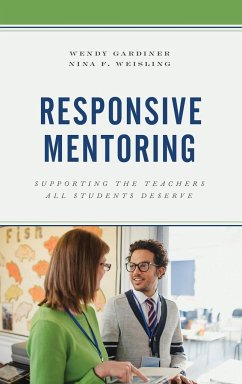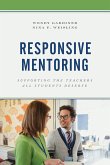- Gebundenes Buch
- Merkliste
- Auf die Merkliste
- Bewerten Bewerten
- Teilen
- Produkt teilen
- Produkterinnerung
- Produkterinnerung
Responsive Mentoring advocates for an approach to mentoring that is teacher-centered, scaffolded, and contextualized to teachers' work.
Andere Kunden interessierten sich auch für
![Responsive Mentoring Responsive Mentoring]() Wendy GardinerResponsive Mentoring39,99 €
Wendy GardinerResponsive Mentoring39,99 €![Cases on Emotionally Responsive Teaching and Mentoring Cases on Emotionally Responsive Teaching and Mentoring]() Cases on Emotionally Responsive Teaching and Mentoring178,99 €
Cases on Emotionally Responsive Teaching and Mentoring178,99 €![Unearthing Culturally Responsive Mathematics Teaching Unearthing Culturally Responsive Mathematics Teaching]() Emily P. BonnerUnearthing Culturally Responsive Mathematics Teaching48,99 €
Emily P. BonnerUnearthing Culturally Responsive Mathematics Teaching48,99 €![Storytelling in a Culturally Responsive Classroom Storytelling in a Culturally Responsive Classroom]() Laura A. MitchellStorytelling in a Culturally Responsive Classroom119,99 €
Laura A. MitchellStorytelling in a Culturally Responsive Classroom119,99 €![Care and Culturally Responsive Pedagogy in Online Settings Care and Culturally Responsive Pedagogy in Online Settings]() Care and Culturally Responsive Pedagogy in Online Settings162,99 €
Care and Culturally Responsive Pedagogy in Online Settings162,99 €![Self-Regulated Learning and Culturally Responsive Pedagogy Self-Regulated Learning and Culturally Responsive Pedagogy]() Aloysius C. AnyichieSelf-Regulated Learning and Culturally Responsive Pedagogy120,99 €
Aloysius C. AnyichieSelf-Regulated Learning and Culturally Responsive Pedagogy120,99 €![Responsive Teaching Responsive Teaching]() Harry Fletcher-WoodResponsive Teaching180,99 €
Harry Fletcher-WoodResponsive Teaching180,99 €-
-
-
Responsive Mentoring advocates for an approach to mentoring that is teacher-centered, scaffolded, and contextualized to teachers' work.
Hinweis: Dieser Artikel kann nur an eine deutsche Lieferadresse ausgeliefert werden.
Hinweis: Dieser Artikel kann nur an eine deutsche Lieferadresse ausgeliefert werden.
Produktdetails
- Produktdetails
- Verlag: Globe Pequot Publishing Group Inc/Bloomsbury
- Seitenzahl: 160
- Erscheinungstermin: 4. August 2020
- Englisch
- Abmessung: 235mm x 157mm x 13mm
- Gewicht: 392g
- ISBN-13: 9781475851366
- ISBN-10: 1475851367
- Artikelnr.: 58814331
- Herstellerkennzeichnung
- Books on Demand GmbH
- In de Tarpen 42
- 22848 Norderstedt
- info@bod.de
- 040 53433511
- Verlag: Globe Pequot Publishing Group Inc/Bloomsbury
- Seitenzahl: 160
- Erscheinungstermin: 4. August 2020
- Englisch
- Abmessung: 235mm x 157mm x 13mm
- Gewicht: 392g
- ISBN-13: 9781475851366
- ISBN-10: 1475851367
- Artikelnr.: 58814331
- Herstellerkennzeichnung
- Books on Demand GmbH
- In de Tarpen 42
- 22848 Norderstedt
- info@bod.de
- 040 53433511
Wendy Gardiner is currently an Associate Professor and the Jolita Hylland Benson Endowed Chair in Elementary Education at Pacific Lutheran University where she teaches literacy courses. For nearly 20 years she has mentored pre-service, new, and veteran teachers in urban schools and has worked with mentors conducting research to inform and advance this important work. Nina F. Weisling is currently an Assistant Professor of Education at Carthage College in Kenosha, Wisconsin, where she primarily teaches courses related to special education and conducts research related to mentoring and inclusive practices. Prior to this she was a special educator, general educator, and mentor for pre-service, new, and veteran teachers.
Foreword
Preface
Introduction
Part I: Foundations of Effective Mentoring
Chapter 1: Educative Mentoring: A Fundamental Shift in Mentoring
Chapter 2: Trust: The Cornerstone for Educative Mentoring
Chapter 3: Goal Setting and Collecting Useful Data Within the Mentoring
Cycle
Part II: Mentoring Practices
Chapter 4: Debriefing Sessions: The Heart of Mentoring
Chapter 5: Brief Interactions: Making the Most of a Few Minutes
Chapter 6: Co-Planning and Resource Supports: Helping Fill in the Gaps
Chapter 7: Video Analysis: Visual Support for Teacher Growth
Chapter 8: Collegial Visits: Learning from Peers
Chapter 9: Demonstrations & Rehearsal: Ensuring Teachers Feel Ready to
Teach
Chapter 10: Stepping into the Action to Provide "Real-Time" Support
Chapter 11: Demonstration Teaching: Contextualized Mentor Modeling
Chapter 12: Co-teaching: Sharing the Risk and Responsibility for Ambitious
Teaching
Part III: Mentoring The Mentor
Chapter 13: Mentoring the Mentors
Chapter 14: Video Analysis: A Visual Support for Mentor Growth
Chapter 15: It Takes Two (or More): Co-Mentoring For Improved Practice
Chapter 16: Mentor Development Sessions: Learning With and From Team
Leaders
Afterword: Final Thoughts As You Move Forward with Educative Mentoring
References
Appendix A
Appendix B
Appendix C
Preface
Introduction
Part I: Foundations of Effective Mentoring
Chapter 1: Educative Mentoring: A Fundamental Shift in Mentoring
Chapter 2: Trust: The Cornerstone for Educative Mentoring
Chapter 3: Goal Setting and Collecting Useful Data Within the Mentoring
Cycle
Part II: Mentoring Practices
Chapter 4: Debriefing Sessions: The Heart of Mentoring
Chapter 5: Brief Interactions: Making the Most of a Few Minutes
Chapter 6: Co-Planning and Resource Supports: Helping Fill in the Gaps
Chapter 7: Video Analysis: Visual Support for Teacher Growth
Chapter 8: Collegial Visits: Learning from Peers
Chapter 9: Demonstrations & Rehearsal: Ensuring Teachers Feel Ready to
Teach
Chapter 10: Stepping into the Action to Provide "Real-Time" Support
Chapter 11: Demonstration Teaching: Contextualized Mentor Modeling
Chapter 12: Co-teaching: Sharing the Risk and Responsibility for Ambitious
Teaching
Part III: Mentoring The Mentor
Chapter 13: Mentoring the Mentors
Chapter 14: Video Analysis: A Visual Support for Mentor Growth
Chapter 15: It Takes Two (or More): Co-Mentoring For Improved Practice
Chapter 16: Mentor Development Sessions: Learning With and From Team
Leaders
Afterword: Final Thoughts As You Move Forward with Educative Mentoring
References
Appendix A
Appendix B
Appendix C
Foreword
Preface
Introduction
Part I: Foundations of Effective Mentoring
Chapter 1: Educative Mentoring: A Fundamental Shift in Mentoring
Chapter 2: Trust: The Cornerstone for Educative Mentoring
Chapter 3: Goal Setting and Collecting Useful Data Within the Mentoring
Cycle
Part II: Mentoring Practices
Chapter 4: Debriefing Sessions: The Heart of Mentoring
Chapter 5: Brief Interactions: Making the Most of a Few Minutes
Chapter 6: Co-Planning and Resource Supports: Helping Fill in the Gaps
Chapter 7: Video Analysis: Visual Support for Teacher Growth
Chapter 8: Collegial Visits: Learning from Peers
Chapter 9: Demonstrations & Rehearsal: Ensuring Teachers Feel Ready to
Teach
Chapter 10: Stepping into the Action to Provide "Real-Time" Support
Chapter 11: Demonstration Teaching: Contextualized Mentor Modeling
Chapter 12: Co-teaching: Sharing the Risk and Responsibility for Ambitious
Teaching
Part III: Mentoring The Mentor
Chapter 13: Mentoring the Mentors
Chapter 14: Video Analysis: A Visual Support for Mentor Growth
Chapter 15: It Takes Two (or More): Co-Mentoring For Improved Practice
Chapter 16: Mentor Development Sessions: Learning With and From Team
Leaders
Afterword: Final Thoughts As You Move Forward with Educative Mentoring
References
Appendix A
Appendix B
Appendix C
Preface
Introduction
Part I: Foundations of Effective Mentoring
Chapter 1: Educative Mentoring: A Fundamental Shift in Mentoring
Chapter 2: Trust: The Cornerstone for Educative Mentoring
Chapter 3: Goal Setting and Collecting Useful Data Within the Mentoring
Cycle
Part II: Mentoring Practices
Chapter 4: Debriefing Sessions: The Heart of Mentoring
Chapter 5: Brief Interactions: Making the Most of a Few Minutes
Chapter 6: Co-Planning and Resource Supports: Helping Fill in the Gaps
Chapter 7: Video Analysis: Visual Support for Teacher Growth
Chapter 8: Collegial Visits: Learning from Peers
Chapter 9: Demonstrations & Rehearsal: Ensuring Teachers Feel Ready to
Teach
Chapter 10: Stepping into the Action to Provide "Real-Time" Support
Chapter 11: Demonstration Teaching: Contextualized Mentor Modeling
Chapter 12: Co-teaching: Sharing the Risk and Responsibility for Ambitious
Teaching
Part III: Mentoring The Mentor
Chapter 13: Mentoring the Mentors
Chapter 14: Video Analysis: A Visual Support for Mentor Growth
Chapter 15: It Takes Two (or More): Co-Mentoring For Improved Practice
Chapter 16: Mentor Development Sessions: Learning With and From Team
Leaders
Afterword: Final Thoughts As You Move Forward with Educative Mentoring
References
Appendix A
Appendix B
Appendix C








